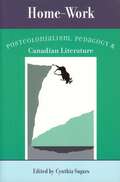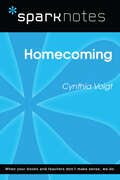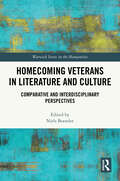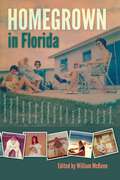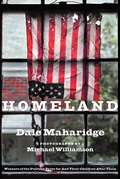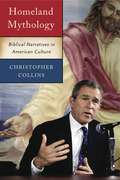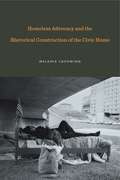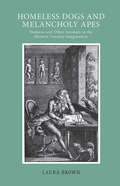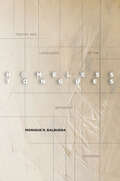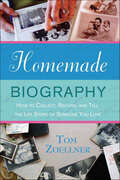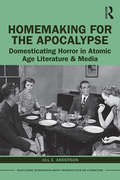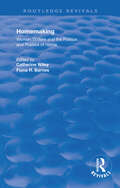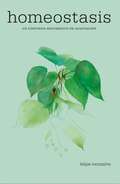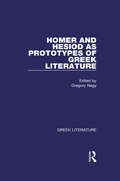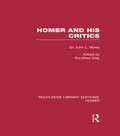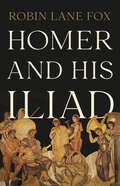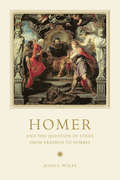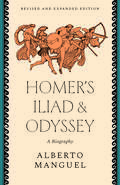- Table View
- List View
Home-Work: Postcolonialism, Pedagogy, and Canadian Literature (Reappraisals: Canadian Writers)
by Cynthia SugarsCanadian literature, and specifically the teaching of Canadian literature, has emerged from a colonial duty to a nationalist enterprise and into the current territory of postcolonialism. From practical discussions related to specific texts, to more theoretical discussions about pedagogical practice regarding issues of nationalism and identity, Home-Work constitutes a major investigation and reassessment of the influence of postcolonial theory on Canadian literary pedagogy from some of the top scholars in the field. Published in English.
Homecoming (SparkNotes Literature Guide Series)
by SparkNotesHomecoming (SparkNotes Literature Guide) by Cynthia Voigt Making the reading experience fun! Created by Harvard students for students everywhere, SparkNotes is a new breed of study guide: smarter, better, faster.Geared to what today's students need to know, SparkNotes provides:chapter-by-chapter analysis explanations of key themes, motifs, and symbols a review quiz and essay topics Lively and accessible, these guides are perfect for late-night studying and writing papers.
Homecoming Veterans in Literature and Culture: Comparative and Interdisciplinary Perspectives (Warwick Studies in the Humanities)
by Niels BoenderFrom Homer’s Odyssey itself, the return of the veteran to his or her home has been a central trope of the literary canon. Huge bureaucracies and a panoply of global organisations are deeply concerned with facilitating a painless return to stable homes. This book presents ‘homecoming’ as an analytical lens to better understand veterans’ return and reintegration after conflict. Home is held to be multidimensional, a concept encapsulating the physical and the social, particularly disrupted by experiences of violence. Homecoming is, therefore, not a mere moment but a process that can unfold over years and decades as old and new bonds of familiarity are forged. Struggles over the home and homecoming are, moreover, endlessly political, bound up in questions of identity and the nation. Looking across times, places, and disciplines, the collection centres both historical and representational approaches to veterancy.
Homegrown in Florida
by William McKeenFlorida can seem like a child's dream of paradise: endless sunny days, trips to the beach to swim and build sandcastles, bike riding without a jacket in the middle of January, and magical themeparks only a short drive away. But what was life really like for those who grew up here?During a recent reunion, writers Bill McKeen, Tim Dorsey, and Jeff Klinkenberg found themselves lamenting that so many of their childhood memories were fading away. For them, and for many, Florida is not just a place people go to, it’s where they come from.That can mean many things to many people, as the stellar cast of writers, journalists, and musicians eloquently reveal in Homegrown in Florida. This utterly satisfying and powerful anthology aims at the heart of the glories of childhood and the pain of growing up. Both a celebration of the exotic, untamed wilderness of a youth filled with moss-draped oaks and citrus fields, evergreen winters and palmetto fronds, and a reminder that innocence often gave way to experience as bike paths became private developments, and swimming holes were paved over by interstates, Homegrown in Florida is filled with tears and laughter alike.Featuring contributions from Carl Hiaasen, Tom Petty, Zora Neale Hurston, Michael Connelly, and many more, this is a book for every child of old Florida, and every child at heart.
Homeland
by Dale Maharidge Michael WilliamsonHomeland is Pulitzer Prize winning author Maharidge's biggest and most ambitious book yet, weaving together the disparate and contradictory strands of contemporary American society-common decency alongside race rage, the range of dissenting voices, and the roots of discontent that defy political affiliation. Here are American families who can no longer pay their medical bills, who've lost high-wage-earning jobs to NAFTA. And here are white supremacists who claim common ground with progressives. Maharidge's approach is rigorously historical, creating a tapestry of today as it is lived in America, a self-portrait that is shockingly different from what we're used to seeing and yet which rings of truth.
Homeland Mythology: Biblical Narratives in American Culture
by Christopher CollinsSince 9/11, America has presented itself to the world as a Christianist culture, no less antimodern and nostalgic for an idealized past than its Islamist foes. The master-narrative both sides share might sound like this: Once upon a time, the values of the righteous community coincided with those of the state. Home and land were harmoniously united under God. But through intellectual pride (read: science) and disobedience (read: human rights), this God-blessed homeland was lost and is now worth every drop of blood it takes, ours and others’, to recover.For Americans, the prime source for this once-and-future-kingdom myth is the Bible, with its many narratives of blessings gained, lost, and regained: the garden of Eden, the covenant with Abraham, the bondage in Egypt, the exodus under Moses, the glory of David and Solomon’s realm, the coming of the promised Messiah, his crucifixion, resurrection, and ascension into heaven, his apocalyptic return at the end of history, and his establishment of the earthly kingdom of God. As Homeland Mythology shows, these biblical narratives have, over time, inspired a multitude of nationalist narratives, myths ingeniously spun out to justify a number of decidedly unchristian policies and institutions—from Indian genocide, the slave trade, and the exploitation of immigrant workers to Manifest Destiny, imperial expansionism, and, most recently, preemptive war.On March 25, 2001, George W. Bush shared a bit of political wisdom: “You can fool some of the people all of the time—and those are the ones you have to concentrate on.” The cynical use of religion to cloak criminal behavior is always worth exposing, but why our leaders lie to us is no longer a mystery. What does remain mysterious is why so many of us are disposed to believe their lies. The unexamined issue that this book addresses is, therefore, not the mendacity of the few, but the credulity of the many.
Homeless Advocacy and the Rhetorical Construction of the Civic Home (Rhetoric and Democratic Deliberation #19)
by Melanie LoehwingHomeless assistance has frequently adhered to the “three hots and a cot” model, which prioritizes immediate material needs but may fail to address the political and social exclusion of people experiencing homelessness. In this study, Loehwing reconsiders typical characterizations of homelessness, citizenship, and democratic community through unconventional approaches to homeless advocacy and assistance.While conventional homeless advocacy rhetoric establishes the urgency of homeless suffering, it also implicitly invites housed publics to understand homelessness as a state of abnormality that destines the individuals suffering it to life outside the civic body. In contrast, Loehwing focuses on atypical models of homeless advocacy: the meal-sharing initiatives of Food Not Bombs, the international competition of the Homeless World Cup, and the annual Homeless Persons’ Memorial Day campaign. She argues that these modes of unconventional homeless advocacy provide rhetorical exemplars of a type of inclusive and empowering civic discourse that is missing from conventional homeless advocacy and may be indispensable for overcoming homeless marginalization and exclusion in contemporary democratic culture.Loehwing’s interrogation of homeless advocacy rhetorics demonstrates how discursive practices shape democratic culture and how they may provide a potential civic remedy to the harms of disenfranchisement, discrimination, and displacement. This book will be welcomed by scholars whose work focuses on the intersections of democratic theory and rhetorical and civic studies, as well as by homelessness advocacy groups.
Homeless Advocacy and the Rhetorical Construction of the Civic Home (Rhetoric and Democratic Deliberation)
by Melanie LoehwingHomeless assistance has frequently adhered to the “three hots and a cot” model, which prioritizes immediate material needs but may fail to address the political and social exclusion of people experiencing homelessness. In this study, Loehwing reconsiders typical characterizations of homelessness, citizenship, and democratic community through unconventional approaches to homeless advocacy and assistance.While conventional homeless advocacy rhetoric establishes the urgency of homeless suffering, it also implicitly invites housed publics to understand homelessness as a state of abnormality that destines the individuals suffering it to life outside the civic body. In contrast, Loehwing focuses on atypical models of homeless advocacy: the meal-sharing initiatives of Food Not Bombs, the international competition of the Homeless World Cup, and the annual Homeless Persons’ Memorial Day campaign. She argues that these modes of unconventional homeless advocacy provide rhetorical exemplars of a type of inclusive and empowering civic discourse that is missing from conventional homeless advocacy and may be indispensable for overcoming homeless marginalization and exclusion in contemporary democratic culture.Loehwing’s interrogation of homeless advocacy rhetorics demonstrates how discursive practices shape democratic culture and how they may provide a potential civic remedy to the harms of disenfranchisement, discrimination, and displacement. This book will be welcomed by scholars whose work focuses on the intersections of democratic theory and rhetorical and civic studies, as well as by homelessness advocacy groups.
Homeless Dogs and Melancholy Apes: Humans and Other Animals in the Modern Literary Imagination
by Laura BrownIn eighteenth-century England, the encounter between humans and other animals took a singular turn with the discovery of the great apes and the rise of bourgeois pet keeping. These historical changes created a new cultural and intellectual context for the understanding and representation of animal-kind, and the nonhuman animal has thus played a significant role in imaginative literature from that period to the present day. In Homeless Dogs and Melancholy Apes, Laura Brown shows how the literary works of the eighteenth century use animal-kind to bring abstract philosophical, ontological, and metaphysical questions into the realm of everyday experience, affording a uniquely flexible perspective on difference, hierarchy, intimacy, diversity, and transcendence.Writers of this first age of the rise of the animal in the modern literary imagination used their nonhuman characters—from the lapdogs of Alexander Pope and his contemporaries to the ill-mannered monkey of Frances Burney's Evelina or the ape-like Yahoos of Jonathan Swift—to explore questions of human identity and self-definition, human love and the experience of intimacy, and human diversity and the boundaries of convention. Later literary works continued to use imaginary animals to question human conventions of form and thought. Brown pursues this engagement with animal-kind into the nineteenth century—through works by Mary Shelley, Charles Dickens, and Elizabeth Barrett Browning—and into the twentieth, with a concluding account of Paul Auster's dog-novel, Timbuktu. Auster's work suggests that—today as in the eighteenth century—imagining other animals opens up a potential for dissonance that creates distinctive opportunities for human creativity.
Homeless Tongues: Poetry and Languages of the Sephardic Diaspora
by Monique BalbuenaThis book examines a group of multicultural Jewish poets to address the issue of multilingualism within a context of minor languages and literatures, nationalism, and diaspora. It introduces three writers working in minor or threatened languages who challenge the usual consensus of Jewish literature: Algerian Sadia Lévy, Israeli Margalit Matitiahu, and Argentine Juan Gelman. Each of them--Lévy in French and Hebrew, Matitiahu in Hebrew and Ladino, and Gelman in Spanish and Ladino--expresses a hybrid or composite Sephardic identity through a strategic choice of competing languages and intertexts. Monique R. Balbuena's close literary readings of their works, which are mostly unknown in the United States, are strongly grounded in their social and historical context. Her focus on contemporary rather than classic Ladino poetry and her argument for the inclusion of Sephardic production in the canon of Jewish literature make Homeless Tongues a timely and unusual intervention.
Homemade Biography: How to Collect, Record, and Tell the Life Story of Someone You Love
by Tom ZoellnerHow well do you really know the older people in your family? And how will you make sure their stories will be preserved for generations to come? Homemade Biography is a fun and practical guide to recording a relative's story so it will never be forgotten. New York Times bestselling author Tom Zoellner, who wrote his own grandmother's biography, draws on years of interviewing and writing experience to provide: - More than 300 questions designed to provoke vivid responses Case studies of successful family biographies - A revolutionary technique for writing with grace and energy - Ways of finding a connective theme buried in a jumble of facts - Strategies for dealing with sensitive topics- Professional methods of editing for quality and accuracy - Tips for making your relative's story a part of the permanent historical recordMost of us think about bringing a tape recorder or a notebook to a visit with an older relative, but few actually do it. This clear-eyed manual gives you all the expertise you'll need to finish what could be one of the most fulfilling conversations you'll ever have.
Homemaking for the Apocalypse: Domesticating Horror in Atomic Age Literature & Media (Routledge Interdisciplinary Perspectives on Literature)
by Jill AndersonIn Homemaking for the Apocalypse, Jill E. Anderson interrogates patterns of Atomic Age conformity that controlled the domestic practices and private activities of Americans. Used as a way to promote security in a period rife with anxieties about nuclear annihilation and The Bomb, these narratives of domesticity were governed by ideals of compulsory normativity, and their circulation upheld the wholesale idealization of homemaking within a white, middle-class nuclear family and all that came along with it: unchecked reproduction, constant consumerism, and a general policing of practices deemed contradictory to normative American life. Homemaking for the apocalypse seeks out the disruptions to the domestic ideals found in memoirs, Civil Defense literature, the fallout shelter debate, horror films, comics, and science fiction, engaging in elements of horror in order to expose how closely domestic practices are tied to dread and anxiety. Homemaking for the Apocalypse offers a narrative of the Atomic Age that calls into question popular memory’s acceptance of the conformity thesis and proposes new methods for critiquing the domestic imperative of the period by acknowledging its deep tie to horror.
Homemaking: Women Writers and the Politics and Poetics of Home
by Catherine Wiley Fiona R. BarnesFirst published in 1996. The present volume, Homemaking: Women Writers and the Politics and Poetics of Home, enters the critical discourse on gender by way of two of its most pressing issues: the politics of women’s locations at the end of the twentieth century, and the division of experience into public and private. That the emergence of systematic feminist thought in the west coincided with the invention of "private life" should not surprise us. Feminist thinkers from Mary Wollstonecroft on were quick to realize that the designation of the public and the private, male and female, was key to the subordination of women.
Homeostasis: Un continuo movimiento de adaptacion
by Felipe MonsalveUn libro de entrevistas a varias personas notables que lograron armonía y bienestar en su vida de una manera fuera de lo común. Humberto Maturana, Manfred Max-Neef, Douglas Tompkins, Gastón Soublette, Sergio Larraín, Adriana Hoffmann, son algunos de los 23 entrevistados que contiene este libro y en el que cuentan la razón por la cual se alejaron del sistema, su amor por la naturaleza y cómo alcanzaron la armonía y el bienestar en sus vidas. Entrevistas en primera persona, donde nos aconsejan sobre la importancia de alejarse del ego, habitar en paz con el otro y donde el diálogo fecundo puede lograr los más importantes objetivos. Homeostasis, es decir la capacidad del organismo de establecer el equilibrio, es un libro honesto, crítico y sobre todo una serie de consejos de personas notables, que han sabido hacer de su vida algo distinto y único.
Homer
by A. M. BowieThe second part of the Odyssey takes epic in new directions, giving significant roles to people of 'lower status' and their way of life: epic notions of the primacy of the aristocrat and the achievements of the Trojan War are submitted to scrutiny. Books XIII and XIV contain some of the subtlest human exchanges in the poem, as Athena and Odysseus spar with each other and Odysseus tests the quiet patience of his swineherd Eumaeus. The principal themes and narrative structures, especially of disguise and recognition, which the second part uses with remarkable economy, are established here. The Introduction also includes a detailed historical account of the Homeric dialect, as well as sections on metre and the text itself. The Commentary on the Greek text pays particular attention to the exposition of unfamiliar linguistic forms and constructions. The literary parts of the Introduction and the Commentary are accessible to all.
Homer
by Johannes Haubold Barbara GraziosiThe sixth book of the Iliad includes some of the most memorable and best-loved episodes in the whole poem: it holds meaning and interest for many different people, not just students of ancient Greek. Book 6 describes how Glaukos and Diomedes, though fighting on opposite sides, recognise an ancient bond of hospitality and exchange gifts on the battlefield. It then follows Hector as he enters the city of Troy and meets the most important people in his life: his mother, Helen and Paris, and finally his wife and baby son. It is above all through the loving and fraught encounter between Hector and Andromache that Homer exposes the horror of war. This edition is suitable for undergraduates at all levels, and students in the upper forms of schools. The Introduction requires no knowledge of Greek and is intended for all readers interested in Homer.
Homer
by Irene J. F. De JongBook XXII recounts the climax of the Iliad: the fatal encounter between the main defender of Troy and the greatest warrior of the Greeks, which results in the death of Hector and Achilles' revenge for the death of his friend Patroclus. At the same time it adumbrates Achilles' own death and the fall of Troy. This edition will help students and scholars better appreciate this key part of the epic poem. The introduction summarises central debates in Homeric scholarship, such as the circumstances of composition and the literary interpretation of an oral poem, and offers synoptic discussions of the structure of the Iliad, the role of the narrator, similes and epithets. There is a separate section on language, which provides a compact list of the most frequent Homeric characteristics. The commentary offers up-to-date linguistic guidance, and elucidates narrative techniques, typical elements and central themes.
Homer and Hesiod as Prototypes of Greek Literature: Greek Literature (Greek Literature Ser. #Vol. 6)
by Gregory NagyThis volume is available on its own or as part of the seven volume set, Greek Literature. This collection reprints in facsimile the most influential scholarship published in this field during the twentieth century. For a complete list of the volume titles in this set, see the listing for Greek Literature [ISBN 0-8153-3681-0].
Homer and His Critics (Routledge Library Editions: Homer)
by John MyresHere is presented a succinct and insightful account of the reception of the Iliad and Odyssey from antiquity to the mid-twentieth century. The overall result is less a systematic history than a series of independent studies differing in scale and focus, the chapter on Gladstone being the most comprehensive and detailed. First published in 1958. The author gives greatest attention to those who made active use of Homer rather than passive, even if admiring, readers: Virgil because he wrote the Aeneid, Gladstone because he brought him to prominence in Oxford education, Wood because he sought out the geography and Schliemann because he dug for the kings. The emphasis is thus placed less on the purely academic critic than on the traveller and the innovative amateur. A valuable contribution to a subject of perennial fascination, this will be of interest to all students and teachers of the classics.
Homer and His Iliad
by Robin Lane FoxA &“compelling and impressive&” (Sunday Times) reassessment of the Iliad, uncovering how the poem was written and why it remains enduringly powerful The Iliad is the world&’s greatest epic poem—heroic battle and divine fate set against the Trojan War. Its beauty and profound bleakness are intensely moving, but great questions remain: Where, how, and when was it composed and why does it endure? Robin Lane Fox addresses these questions, drawing on a lifelong love and engagement with the poem. He argues for a place, a date, and a method for its composition—subjects of ongoing controversy—combining the detailed expertise of a historian with a poetic reader&’s sensitivity. Lane Fox considers hallmarks of the poem; its values, implicit and explicit; its characters; its women; its gods; and even its horses. Thousands of readers turn to the Iliad every year. Drawing on fifty years of reading and research, Lane Fox offers us a breathtaking tour of this magnificent text, revealing why the poem has endured for ages.
Homer and the Question of Strife from Erasmus to Hobbes
by Jessica WolfeFrom antiquity through the Renaissance, Homer's epic poems - the Iliad, the Odyssey, and the various mock-epics incorrectly ascribed to him - served as a lens through which readers, translators, and writers interpreted contemporary conflicts. They looked to Homer for wisdom about the danger and the value of strife, embracing his works as a mythographic shorthand with which to describe and interpret the era's intellectual, political, and theological struggles.Homer and the Question of Strife from Erasmus to Hobbes elegantly exposes the ways in which writers and thinkers as varied as Erasmus, Rabelais, Spenser, Milton, and Hobbes presented Homer as a great champion of conflict or its most eloquent critic. Jessica Wolfe weaves together an exceptional range of sources, including manuscript commentaries, early modern marginalia, philosophical and political treatises, and the visual arts. Wolfe's transnational and multilingual study is a landmark work in the study of classical reception that has a great deal to offer to anyone examining the literary, political, and intellectual life of early modern Europe.
Homer in Stone
by David PetrainThe Tabulae Iliacae are a group of carved stone plaques created in the context of early Imperial Rome that use miniature images and text to retell stories from Greek myth and history - chief among them Homer's Iliad and the fall of Troy. In this book, Professor Petrain moves beyond the narrow focus on the literary and iconographic sources of the Tabulae that has characterized earlier scholarship. Drawing on ancient and modern theories of narrative, he explores instead how the tablets transfer the Troy saga across both medium and culture as they create a system of visual storytelling that relies on the values and viewing habits of Roman viewers. The book comprehensively situates the tablets in the urban fabric of Augustan Rome. New photographs of the tablets, together with re-editions and translations of key inscriptions, offer a new, clearer view of these remarkable documents of the Roman appropriation of Greek epic.
Homer on the Gods and Human Virtue
by Peter J. AhrensdorfThis book seeks to restore Homer to his rightful place among the principal figures in the history of political and moral philosophy. Through this fresh and provocative analysis of the Iliad and the Odyssey, Peter J. Ahrensdorf examines Homer's understanding of the best life, the nature of the divine, and the nature of human excellence. According to Ahrensdorf, Homer teaches that human greatness eclipses that of the gods, that the contemplative and compassionate singer ultimately surpasses the heroic warrior in grandeur, and that it is the courageously questioning Achilles, not the loyal Hector or even the wily Odysseus, who comes closest to the humane wisdom of Homer himself. Thanks to Homer, two of the distinctive features of Greek civilization are its extraordinary celebration of human excellence, as can be seen in Greek athletics, sculpture, and nudity, and its singular questioning of the divine, as can be seen in Greek philosophy.
Homer'S Trojan Theater
by Jenny Strauss ClayMoving away from the verbal and thematic repetitions that have dominated Homeric studies and exploiting the insights of cognitive psychology, this highly innovative and accessible study focuses on the visual poetics of the Iliad as the narrative is envisioned by the poet and rendered visible. It does so through a close analysis of the often-neglected 'Battle Books'. They here emerge as a coherently visualized narrative sequence rather than as a random series of combats, and this approach reveals, for instance, the significance of Sarpedon's attack on the Achaean Wall and Patroclus' path to destruction. In addition, Professor Strauss Clay suggests new ways of approaching ancient narratives: not only with one's ear, but also with one's eyes. She further argues that the loci system of mnemonics, usually attributed to Simonides, is already fully exploited by the Iliad poet to keep track of his cast of characters and to organize his narrative.
Homer's "Iliad" and "Odyssey": A Biography
by Alberto ManguelA worldwide exploration of the history, purpose, and inescapable influence of the Iliad and the Odyssey that will inspire readers to think anew about Homer’s work No one knows whether Homer was a real person, but there is no doubt that the epic poems assembled under his name are foundations of Western literature. The Iliad and the Odyssey—with their tales of the Trojan War, Achilles, Odysseus and Penelope, the Cyclops, the beautiful Helen of Troy, and the petulant gods—have inspired us for over two and a half millennia and influenced writers from Plato to Virgil, Pope to Joyce, and Dante to Margaret Atwood. In this graceful and sweeping book, Alberto Manguel traces the lineage of Homer’s poems. He examines their original purpose, either as allegory or record of history; surveys the challenges the pagan poems presented to the early Christian world; and looks at their reception after the Reformation through the present day. In this revised and expanded edition, Manguel ignites new ways of thinking about these classic works.
